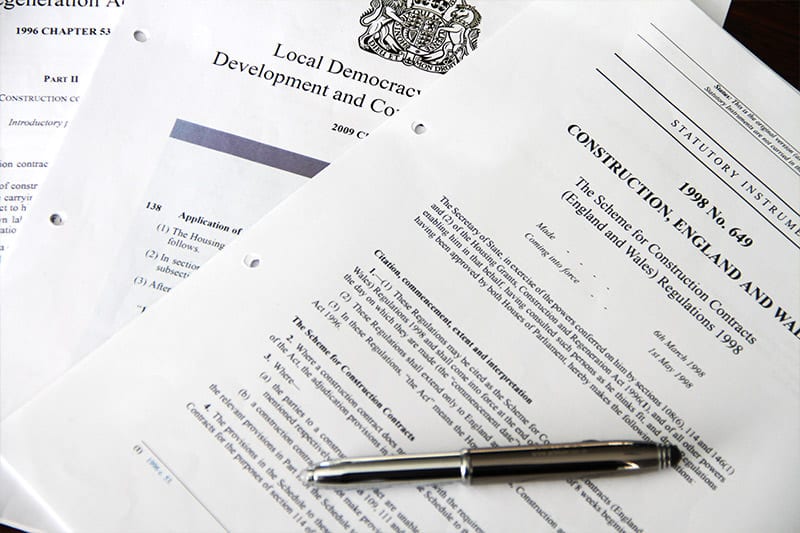On the 1st October 2011, the New Construction Act came into force. The New Act, officially titled the Local Democracy, Economic Development and Construction Act 2009 (Part 8) amends the Housing Grants, Construction and Regeneration Act 1996, both of which provide statutory rights to payment and adjudication in Construction Contracts.
The Acts provide a very important set of rules that must be complied with making certain contract clauses void if not compliant. Where contract terms in respect of payment and adjudication are missing, the Scheme for Construction Contracts (England and Wales) Regulations 1998, amended in 2011 for the new rules, takes over and fills in any gaps. The new Act only applies to contracts formed on or after the 1st October 2011. It should be noted importantly at this point that none of this legislation applies to householder construction contracts.
The New Construction Act Update in Brief
Briefly, the New Construction Act has improved construction contracts and the conduct of adjudication by:
- Abolishing the requirement for a construction contract to be in writing for the purposes of adjudication. All contracts including oral ones can now be adjudicated (Section 139).
- The Adjudicator has a right to correct his decision to remove clerical or typographical errors under the slip rule (Section 140).
- "Tolent" clauses in respect of adjudication costs are now void (Section 141).
- There are new robust payment terms (see below for commentary – Sections (142-144).
- Rights to suspend the works due to non-payment are improved, including an absolute right to costs and expenses reasonably incurred as a result of suspension.
Getting Paid Under the New Construction Act
Every construction contract must have an "adequate" payment mechanism. In very simple terms this, as a minimum, includes a:
- Payment Due Date - when the work must be valued
- Payment Period - time between Payment Due Date and Final Date for Payment
- Final Date for Payment - latest date when payment can be made
In any event, the mechanism should determine the Payment Due Date and the Final Date for Payment. If the contract payment terms do not, the Scheme provisions apply.
Payment Notices
There are strict requirements for both payer and payee to issue and manage payment notices which operate the payment mechanism. The new payment notices are far more powerful and are more like payment certificates. All Notices must state the amount and the "basis" of calculation.
If you are the payer you must be certain of what the Payment Due Date is as there is an absolute requirement to serve a Payment Notice up to 5 days after the Payment Due Date. If this time period is missed it is a breach of contract with consequences.
If you are the payee, if the payer is in breach by failing to serve a Payment Notice in 5 days, the payee can serve a Default Payment Notice, stating the amount due and also giving the basis of calculation. The contract may also demand that an application for payment be made by the payee in such an instance the payee's application for payment automatically becomes the Default Payment Notice. If a Default Notice is served there is no defence to the amount claimed if a Payless Notice is not served in the time specified. A Default Payment Notice that is unchallenged after the last day for a Payless Notice to be served cannot be scrutinised by an adjudicator, it is the sum due. Importantly, it should also be noted that the Final Date for Payment is postponed by the difference in time between the last day a Payment Notice (after day 5) and the date the Default Payment Notice is served. Of course, if the application for payment automatically becomes the sum due, this postponement will never occur.
A Payless Notice is a final chance for the payer to value the works and withhold monies trumping the Payment Notices or Default Payment Notice. However, the Payless Notice must be valid (stating the amount and basis for calculation), it must also be a true value of the work done on the date it is served and it can be scrutinised by an adjudicator. Caution should be exercised by the payer as it may be that a further month of work may have taken place and this will have to be included in the Payless Notice value, which may negate the intended reduced value. The Payless Notice must also be served before the time stipulated in the contract before the Final Date for Payment. In the Scheme the time for service is no later than 7 days before the Final Date for Payment. A Payless Notice cannot be served before an Application for Payment, a Payment Notice (Payer) and a Default Payment Notice (Payee), in such a case the Payless Notice will be invalid.
In the case of all Payment Notices, timing and content is critical to their validity, there is no grace given thus great care should be taken to ensure these Notices are managed properly. If they are ignored or mismanaged by either party they do so at their peril.
Summary of the Types of Payment Notices
- Application for Payment (by Payee) that becomes the Default Payment Notice (if the contract requires an application for payment), if the Payer fails to issue a Payment Notice.
- Payment Notice (by Payer) within 5 days after Payment Due Date.
- Default Payment Notice issued when the Payer fails to serve a Payment Notice within 5 days.
- Payless Notice (by Payer) the last notice that can be served and by the Payer giving the opportunity to withhold monies and revalue the works at the end.
So, in effect, a Notice must be served; if the Payer fails to do so, what the Payee asks for will all be due and cannot be defended after the key dates have all passed, provided the Payee has complied with the Default Payment provisions. Notices cannot be validly served until certain dates have been reached or passed and have no effect if they are late, except for the Default Payment Notice.
In addition to timing, the content of all Payment Notices is critical. The Notices must:-
- state the net sum due
- be issued even if the net sum is zero
- state the "basis" on which the amount is calculated
In any event the notified sum MUST be paid.
So, to get paid under the Act, the Payee must ensure that at least a payment application or Default Payment Notice is submitted within the correct time period required by the contract so that if no Payment Notice is given by the Payer this will ensure (1) payment is due and (2) the sums can be adjudicated!
Payment Process Example – The Scheme
If the contract does not have any payment terms/provisions or has an entirely inadequate payment mechanism, the Scheme applies.
Under the Scheme where nothing is agreed in the contract:
- the Payment Due Date (interim) is 35 days from commencement of work and every 35 days thereafter or on receipt of an application for payment by the Payee, whichever is the later.
- the Payment Due Date in respect of the final payment is 30 days after the work is completed or on application for payment by the Payee, whichever is the later.
- the Payment Period is 17 days.
- the Payment Notice (Payer) must be issued 5 days after the Payment Due Date.
- the application for payment must be submitted and becomes the Default Payment Notice automatically, in the event that the Payer does not issue a Payment Notice.
- the Payless Notice must be served no later than 7 days before the Final Date for Payment.
- the Final Date for Payment is 17 days after the Payment Due Date.
In conclusion, the New Construction Act imposes an obligation on the Payer to evaluate the works and gives the Payee greater protection from payment malpractice. If you have any payment issues or worries or have any queries about the content of this Arbicon guide, please do not hesitate to call us on 01733 233737 or 0207 406 1494 or email advice@arbicon.co.uk

